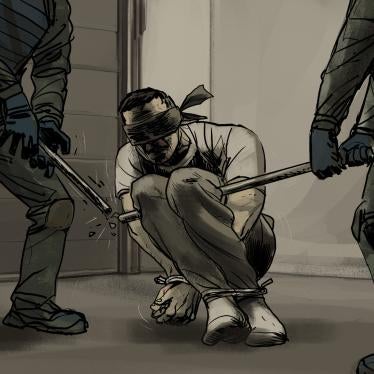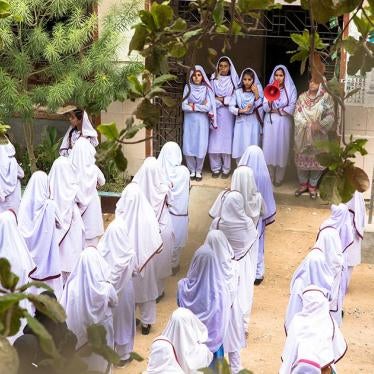Dear Secretary Powell:
Human Rights Watch is writing to you on the urgent matter of a potential humanitarian disaster in southern Sudan. We are alarmed by recent military developments there that threaten to spiral out of control, which could result in enormous cost to civilian lives. We urge the Bush administration to intervene diplomatically with southern military factions and civilian leadership in an effort to halt the tribally-related violence.
The United States has considerable influence among all southerners. It is therefore essential that the U.S. use its leverage with both the Dinka and Nuer communities - respectively the largest and second largest African tribes in the south - to head off the threatened bloodbath. The Bush administration should work first to bring together Nuer leaders who are already feuding, and then to preventively bring together Nuer and Dinka leaders to resolve their simmering conflict.
Despite the complexity of the situation in southern Sudan, early and skillful U.S. diplomatic intervention could make a significant difference in sparing the lives of tens of thousands of civilians. The Nuer-Nuer fighting, a war within a war, for now overshadows the civil war in ferocity of fighting and cost in civilian lives. But it is also very integral to the civil war, which since 1983 pits the Khartoum government against marginalized peoples, particularly Africans in the southern third of the country.
The current crisis also involves the unraveling of the Wunlit agreement, signed in 1999 and enthusiastically endorsed by the U.S., which put an end to years (1991-99) of Dinka-Nuer cross-border raids. These raids involved thousands of civilian casualties, large-scale theft of cattle, abduction of women and children, and destruction of hundreds of villages. Attacks on civilians and the ruin of the pastoral economy were the immediate cause of the devastating 1993 famine in southern Sudan, in which tens of thousands perished. The current fighting follows the same pattern, and recurrence of famine is almost inevitable unless immediate action is taken.
As usual, a key actor in the current violence among southerners is the Khartoum government, which arms whichever factions and militias are fighting the SPLA. The Khartoum strategy of divide and destroy has worked extremely well in the past, keeping southerners split - Dinka from Nuer, and Nuer from Nuer. Accordingly, Wunlit was the government´s worst nightmare, and its disintegration serves Khartoum well. By provoking divisions among Nuer and other southerners, Khartoum can develop the rich oil resources that lie beneath Nuer territory. A further analysis of the current fighting is attached as an appendix.
In order to prevent new rounds of civilian devastation, we urge the U.S. to immediately take the following diplomatic steps, in coordination with its allies:
- Assume the lead in convening an urgent all-Nuer reconciliation conference in southern Sudan through the New Sudan Council of Churches (NSCC).
- Encourage the Nuer community to settle differences through democratic procedures and end the Nuer-Nuer fighting.
- Focus on preventing impunity for perpetrators of human rights abuses;
- Follow up with reinforcement of the Nuer-Dinka peace agreement signed in Wunlit in 1999 under NSCC auspices, urging the reconvening of already-chosen delegates as a way for both communities to agree on means to prevent an imminent outbreak of Nuer-Dinka fighting.
- Provide substantial material support for Wunlit projects;
- Insist that the largest rebel group, the Sudan People´s Liberation Movement/Army (SPLA), stop sending military support to its Nuer factions and rein in its primary Nuer commander, Cmdr. Peter Gatdet, who is responsible for burning and destroying villages and conducting summary executions of civilians in the recent fighting in Western Upper Nile;
- Request the government of Sudan to stop providing military supplies to its Nuer militias in Upper Nile, which are responsible for abuses such as the killing of civilians and burning of villages - as well as the use of antipersonnel land mines in Eastern Upper Nile;
- Call on Riek Machar and his Sudan People´s Democratic Front/Defense Forces (SPDF) to cease retaliatory scorched earth raids on Nuer villages; Urge that all parties implement an immediate cease-fire and start preparations for peace and reconciliation conferences in Upper Nile and eastern Bahr El Ghazal.
- The cease-fire should prohibit troop movement as well as resupply; Move immediately to rectify imbalances in relief deliveries so that the underserved communities involved, such as the Bul Nuer, receive food and nonfood items as needed;
- Use all possible leverage to convince the government of Sudan to take a hands-off position on relief access to the affected areas. The Sudan government´s attention should be drawn to the world´s interest in avoiding a famine similar to the one precipitated by the Khartoum government´s ban on relief flights in 1998; and
- Deliver a strong message to the parties to this conflict - including the Sudan government and its Nuer militias, the SPLA, and Nuer faction leader Riek Machar - that the world will not sit by while they destroy the Nuer community; deliver that same message to the commanders doing or directing the fighting.
We believe that immediate diplomatic intervention by the Bush administration could help prevent humanitarian disaster, the destruction of the Wunlit peace agreement, and the devastation of the Nuer of southern Sudan.
Thank you for your attention to these important matters.
Sincerely,
Jemera Rone
Counsel/Sudan Researcher
cc:
Nancy Powell, Acting Assistant Secretary of State for African Affairs
Jendaye Frasier, Senior Director for Africa, National Security Council
Mike Parmly, Acting Assistant Secretary for the Bureau of Democracy, Human Rights and Labor
Alan J. Kreczko, Acting Assistant Secretary for the Bureau of Population, Refugees and Migration
Mark Grossman, Under-Secretary of State for Political Affairs-Designate Johnnie Carson, U.S. Ambassador to Kenya





